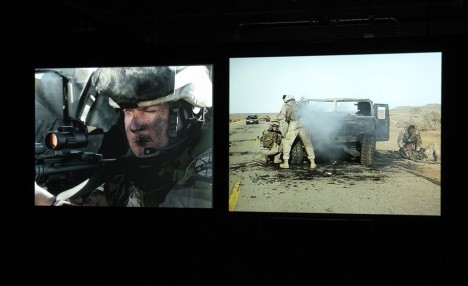Omer Fast
09 May - 30 Nov 2014

Omer Fast
Installation shot of The Casting 2007
Video projection, audio and colour
Duration: 14min, 10sec
Lent by the American Fund for the Tate Gallery, courtesy of the North American Acquisitions Committee with additional assistance from Glenn Fuhrman, Bob Rennie, Elisa Nuyten, Laura Rapp 2010
Installation shot of The Casting 2007
Video projection, audio and colour
Duration: 14min, 10sec
Lent by the American Fund for the Tate Gallery, courtesy of the North American Acquisitions Committee with additional assistance from Glenn Fuhrman, Bob Rennie, Elisa Nuyten, Laura Rapp 2010
Using carefully edited video footage, Omer Fast examines the conventions of media reportage, storytelling and historical representation.
The Casting 2007 is a four-channel video installation projected on two double-sided screens, so that only two projections can be seen at any one time. One side shows obviously edited footage of an American soldier in plain clothes telling the artist two violent stories: one about a self-harming girl he met in Germany, and another about a traumatic experience from his time in the Iraq war. On the other side, Fast presents reconstructions of these two interwoven stories and of the casting session for the role of the soldier. These scenes also appear to be heavily constructed: each sequence sees the actors holding unnatural poses, simulating the look of a still image.
In many works by Fast, footage is edited into single words or sounds and then re-arranged so that a speaker seems to utter a sentence that they never said. In The Casting, Fast uses this editing technique to mix the soldier’s two stories together, making the viewer conscious of the fabricated nature of this material. By extension, this serves as a reflection on all mediated imagery of world events, and on the impossibility of representing traumatic experiences using conventional linear narratives.
The Casting tells the story of the tragic killing of an innocent civilian in Iraq, but rather than comment on the war itself, Fast addresses the politics of journalism, narration and reconstruction, challenging the tendency to reduce traumatic and violent events to easily consumable content.
Omer Fast was born in Israel in 1972. He lives and works in New York and Berlin.
Curated by Mark Godfrey and Valentina Ravaglia
The Casting 2007 is a four-channel video installation projected on two double-sided screens, so that only two projections can be seen at any one time. One side shows obviously edited footage of an American soldier in plain clothes telling the artist two violent stories: one about a self-harming girl he met in Germany, and another about a traumatic experience from his time in the Iraq war. On the other side, Fast presents reconstructions of these two interwoven stories and of the casting session for the role of the soldier. These scenes also appear to be heavily constructed: each sequence sees the actors holding unnatural poses, simulating the look of a still image.
In many works by Fast, footage is edited into single words or sounds and then re-arranged so that a speaker seems to utter a sentence that they never said. In The Casting, Fast uses this editing technique to mix the soldier’s two stories together, making the viewer conscious of the fabricated nature of this material. By extension, this serves as a reflection on all mediated imagery of world events, and on the impossibility of representing traumatic experiences using conventional linear narratives.
The Casting tells the story of the tragic killing of an innocent civilian in Iraq, but rather than comment on the war itself, Fast addresses the politics of journalism, narration and reconstruction, challenging the tendency to reduce traumatic and violent events to easily consumable content.
Omer Fast was born in Israel in 1972. He lives and works in New York and Berlin.
Curated by Mark Godfrey and Valentina Ravaglia
